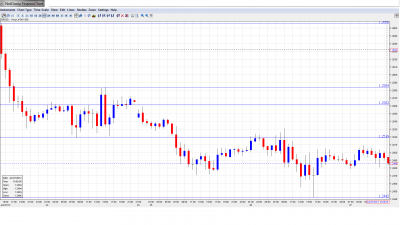EUR/USD continues to trade in a narrow range, as investors stay cautious ahead of the EU Summit on Thursday. The financial crises in Spain and Greece will be at the center of attention, but the European leaders will be discussing a range of topics, including the possibility of a cross-border banking union and closer integration of their budgets. Wednesday started off poorly with disappointing data for German Import Prices. In the US, there are two key releases, Core Durable Goods Orders and Pending Home Sales. The markets are hoping for some better news after yesterday’s weak Consumer Confidence release.
Here’s an update on technicals, fundamentals and what’s going on in the markets.
EUR/USD Technicals
- Asian session: Euro/dollar moved upwards, crossing the 1.25 line and reaching a high of 1.2508. The pair then dropped slightly, and consolidated at 1.2490. In the European session, Euro/dollar is unchanged, and was trading at 1.2488.
- Current range: 1.2440 to 1.2520.
- Further levels in both directions:
- Below: 1.2440, 1.24, 1.2330, 1.2288, and 1.22.
- Above: 1.2520, 1.2587, 1.2660, 1.2760, 1.2814 and 1.2873, 1.29 and 1.2960.
- 1.2440 is still far, but it proved its strength in the past.
- 1.2520 continues to be fluid, and is providing weak resistance.
Euro/Dollar choppy as markets await EU Summit – click on the graph to enlarge.
EUR/USD Fundamentals
- 6:00 German Import Prices. Exp. -0.6%. Actual -0.7%.
- All day: German Prelim CPI. Exp. 0.0%.
- 12:30 US Core Durable Goods Orders. Exp. +0.9%.
- 12:30 US Durable Goods Orders. Exp. +0.5%.
- 14:00 US Pending Home Sales. Exp. +1.2%.
- 14:30 Crude Oil Inventories. Exp. -0.5M.
For more events and lines, see the Euro to dollar forecast
EUR/USD Sentiment
- Markets skeptical about EU Summit: Leaders of all 27 EU countries will meet in Brussels for a critical economic summit on Thursday and Friday. The leaders are under pressure to take some concrete steps, The fiscal crises in Spain and Greece will be the focus of attention, but there will be discussions on a range of topics, including establishing a European banking union and an integrated budget policy. The leaders are under pressure to take some concrete steps, but in all likelihood, no dramatic announcements will come out of the meeting. Germany is becoming more and more isolated in the international scene: the G-20 summit didn’t provide any calming message, as Germany remained tough on measures to shore up the zone. Merkel is also under pressure from the German supreme court, which delays the ESM. The euro might strengthen towards the event but fall afterwards. See 4 reasons to expect a disappointment.
- Spain submits formal aid request: As expected, Spain is sending an official letter in request earlier this week. Yields on Spanish 10 year bonds continue to rise, hitting a precarious 6.87%, after falling nicely on the the hopes that the bailout funds could buy Spanish bonds directly. An independent assessment discussed a shortage of only 62 billion euros in the worst case scenario. As with the bailout announcement, that had 8 holes, also this assessment seems short of the mark and could certainly be revised to the upside. Spanish banks are not famous for their transparency. Adding to Spain’s woes, the Moody’s ratings agency downgraded 28 Spanish banks on Monday. The Spanish government is feeling the heat, and has just passed a new law limiting cash transactions.
- Greek government faces tough challenges: The new Greek government finds itself between a rock and a hard place, trying to comply with its bailout obligations while easing the tremendous economic hardships which the Greek populace is facing. The EU, particularly Germany, will have to show some flexibility on the bailout terms and agree to some changes if it is serious about keeping Greece in the EZ. There are discussions of extending the Greek targets, but Greece is likely to miss those as well. The new Greek government is just getting its feet wet, and the last thing the Euro-zone needs right now is further political instability in the country.
- No QE in US: After the Fed decided not to introduce QE, but did announce that it would extend Operation Twist, Bernanke’s words convinced some analysts that QE3 is just one meeting away. However, the mood has significantly changed now. Dollar printing fuels the price of oil. Without QE3, we see WTI falling below $80. This also helps the dollar. US key releases continue to disappoint, with Consumer Confidence falling below the market expectation. The Richmond Manufacturing Index also posted a poor reading, plunging to an eight-month low.
- ECB Lowers Collateral Demands: The European Central Bank decided to lower the grade of bonds it accepts as collateral, adapting itself to the falling ratings of European countries. This move was heavily criticized by the German Bundesbank. This objection shows that any new move will be limited. Chancellor Merkel spoke more forcefully against the idea of common Eurobonds to help indebted nations, calling it “economically wrong”.
- Contagion for France?: French banks are heavily exposed to Greek and Italian debt, and are watching with dread the turmoil in Spain. The economy has serious structural problems – the debt is about 90 percent of GDP and rising. President Holland is strongly pushing a European bank union, and wants immediate recapitalisation of banks from euro zone rescue funds, which Germany is firmly against. We could see some sharper disagreements between these two powerful neighbors.
- Dark Clouds Hovering over Italy: Italian PM Mario Monti has asked for help from Germany and the ECB as the situation worsens. The Euro-zone’s third largest economy is also suffering from a problematic banking system. This may explode later on. The economy isn’t doing much better, as GDP is squeezing fast. Italy cannot hide behind Spain for too long. If the economy continues to deteriorate, Italy could be the next EZ member to hop onto the bailout bandwagon.

